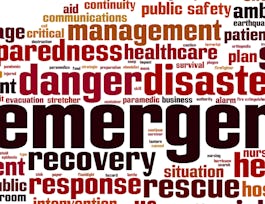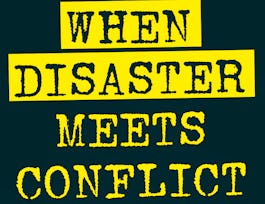Have you ever viewed a news report depicting the aftermath of a devastating natural disaster? The damage to human life and property are both staggering and heartbreaking. All parts of the world face the possibility of floods, hurricanes, tornados, fires, landslides, earthquakes, tsunamis, and other natural phenomena. Are you prepared if disaster would strike you? This course will help you prepare!


Disaster Preparedness
Taught in English
Some content may not be translated
57,690 already enrolled
(1,542 reviews)
Details to know

Add to your LinkedIn profile
7 quizzes
See how employees at top companies are mastering in-demand skills


Earn a career certificate
Add this credential to your LinkedIn profile, resume, or CV
Share it on social media and in your performance review

There are 7 modules in this course
A disaster can be defined in several ways, but in all cases is a destructive event that overwhelms all available resources. A disaster may originate as natural or manmade and may be intentional or accidental. A natural disaster is caused by the forces of nature such as a hurricane, tornado, or earthquake. A manmade disaster may be the result of a terrorist act or industrial accident. Depending on the scope of the disaster, the available resources may be local, state, federal, or multinational. In this module, I will introduce the phases of the disaster cycle. The disaster cycle is a process that we constantly review and strive to improve for the future. It is important for you to understand each phase because clear expectations will enable you to develop an effective plan to keep you and your family safe. At the end of the module, be sure to complete the quiz.
What's included
7 videos2 readings1 quiz
There are a few extreme circumstances such as a 30 foot wall of water during a tsunami or a 10-point Richter scale earthquake that are so severe it is impossible to prepare for the disaster. However, in most cases people can take a few steps to ensure their survivability during a disaster. Personal preparedness involves being both physically and mentally prepared to meet basic needs for at least three days without outside help. Last module, we talked about the disaster cycle including mitigation, response, and recovery. In this module, our focus centers on the response phase. The disaster has hit and you are taking steps to survive and to be as safe and comfortable as possible. In the lectures, I will focus on food, shelter, water, and light in a disaster situation. In addition, we have on-site instructional videos that highlight survival skills such as fire-building and water purification. Do we have any campers in the class? For those of you who are campers, these skills will be a familiar review of basic wilderness survival techniques. The lectures will also give you ideas of supplies that you might want to include in your disaster kit. Take notes during the lectures to prepare for the discussion and quiz.
What's included
5 videos2 readings1 quiz
As we have discussed, disasters significantly overwhelm community resources and it is critical that you have a plan. In the last module, we considered the basics of food, shelter, and water in your personal preparedness plan. In this module, we move on to the topics of security, first aid, and tools. Safety is a major concern for you and your family in post-disaster situations. Use common precautions such as drinking plenty of water, wearing protective gloves and shoes, washing your hands often, and avoiding exhaustion. Depending on the situation, you may have to deal with washed out roads, broken glass, contaminated water, downed power lines, or serious gas leaks.
What's included
7 videos2 readings1 quiz
Disasters are understandably stressful situations that trigger panic, fear, confusion, and uncertainty. During a disaster, you lose control of many aspects of your life. Your family may not be together. You may not be able to access food, water, shelter, transportation, or communication. Since we do not have control of many variables, there is no point in worrying about possible disasters; however, having a clear, detailed plan in place will lessen anxiety and strengthen our ability to make timely, rational decisions if a disaster occurs. Disaster planning takes us “back to basics” and what is most important to our survival. A positive attitude and heightened awareness will help you cope with an emergency situation. In this module's lesson, we focus on attitude and awareness, discuss an awareness-building activity, and submit your disaster preparedness plans. In the next module, you will peer-review the plans and provide feedback to you classmates.
What's included
6 videos2 readings1 quiz1 peer review
In this module, we welcome guest speaker Dr. Kenichi Ogura who will discuss disaster planning in Japan. Dr. Ogura works at the Center for Emergency Medicine in Kanazawa Medical University Hospital. I am confident you will find Dr. Ogura’s presentation very helpful as the Japanese culture plans for disaster preparedness based on extensive research in earthquake and tsunami science. They have spent a great deal of money developing early warning systems and constructing buildings based on strict safety codes. Be sure to read the Time magazine article prior to viewing Dr. Ogura’s presentation. In addition, we will compare and contrast the emergency resources available in your countries. These resources will help you to recognize the role that culture plays in disaster planning. Note that you are also required to review three Personal Disaster Preparedness Plans from other students and provide feedback to them.
What's included
1 video2 readings1 quiz
During Module 6, we will explore triage as a necessary but difficult task during disaster management. Triage is using the available resources to effectively treat the maximum number of patients with the greatest chance of survival. The process requires the clinician to quickly prioritize patients’ treatment plans based on the severity of their conditions. Triage is part of everyday life in a hospital setting, but all patients ultimately receive the treatment that they need. During a disaster, the goal is to ensure that best positive outcome for the most victims.In addition, we will consider disaster preparedness on a larger scale. Perhaps you are responsible for a group of people beyond yourself or your immediate family. You might be responsible for children in a day care setting, employees in a business, customers in a store, or even pets in a kennel. What are the major issues to consider? What supplies and equipment do you need to have available? The activity for this module involves reviewing the feedback you received from your peers and revising your Personal Disaster Preparedness Plan. The discussion focuses on an ethical dilemma that occurred at Memorial Hospital in New Orleans during the Katrina hurricane (2009). Lastly, double-check that you have completed all of the quizzes.
What's included
3 videos1 quiz
In the last module we talked about how disasters can displace you and your family from the comforts of your home, leaving you without food, water, and electricity. However, if you were left without shelter, or forced to take refuge in the natural habitat, are you equipped to survive? In this module we will review a set of wilderness survival techniques commonly known to many campers. Topics will include basic fire-building, water purification, constructing temporary shelters, and practical knives that can assist.
What's included
6 videos2 readings1 quiz
Instructors


Offered by
Recommended if you're interested in Environmental Science and Sustainability

University of Colorado Boulder

Banco Interamericano de Desarrollo

The State University of New York

Erasmus University Rotterdam
Why people choose Coursera for their career




Learner reviews
Showing 3 of 1542
1,542 reviews
- 5 stars
80.28%
- 4 stars
16.27%
- 3 stars
1.62%
- 2 stars
1.03%
- 1 star
0.77%

Open new doors with Coursera Plus
Unlimited access to 7,000+ world-class courses, hands-on projects, and job-ready certificate programs - all included in your subscription
Advance your career with an online degree
Earn a degree from world-class universities - 100% online
Join over 3,400 global companies that choose Coursera for Business
Upskill your employees to excel in the digital economy
Frequently asked questions
Access to lectures and assignments depends on your type of enrollment. If you take a course in audit mode, you will be able to see most course materials for free. To access graded assignments and to earn a Certificate, you will need to purchase the Certificate experience, during or after your audit. If you don't see the audit option:
The course may not offer an audit option. You can try a Free Trial instead, or apply for Financial Aid.
The course may offer 'Full Course, No Certificate' instead. This option lets you see all course materials, submit required assessments, and get a final grade. This also means that you will not be able to purchase a Certificate experience.
When you purchase a Certificate you get access to all course materials, including graded assignments. Upon completing the course, your electronic Certificate will be added to your Accomplishments page - from there, you can print your Certificate or add it to your LinkedIn profile. If you only want to read and view the course content, you can audit the course for free.
You will be eligible for a full refund until two weeks after your payment date, or (for courses that have just launched) until two weeks after the first session of the course begins, whichever is later. You cannot receive a refund once you’ve earned a Course Certificate, even if you complete the course within the two-week refund period. See our full refund policy.


